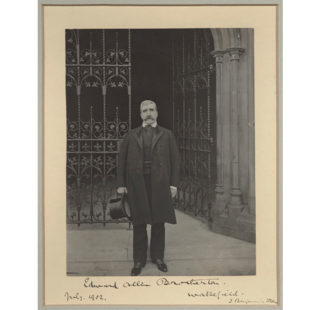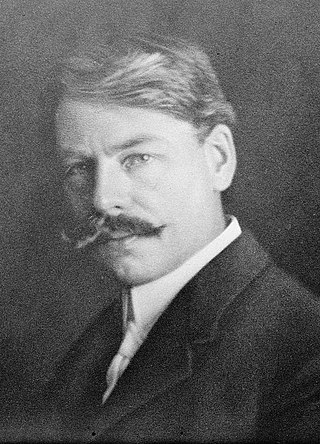
Marshall is a town in Oneida County, New York, United States. The population was 2,131 at the 2010 census.

The Lenape also called the Lenni Lenape, and Delaware people, are an Indigenous people of the Northeastern Woodlands, who live in the United States and Canada.

Brotherton is a village and civil parish in the Selby District of North Yorkshire, England. The village is on a border with the City of Wakefield and West Yorkshire.

Edward Allen Brotherton, 1st Baron Brotherton, known as Sir Edward Brotherton, Bt, between 1918 and 1929, was an industrialist in Wakefield, West Yorkshire, England and a benefactor to the University of Leeds and other causes. He was also a Conservative Party politician, and sat in the House of Commons between 1902 and 1922.

Peel Park is a public urban park in Salford, Greater Manchester, England, located on the flood plain of the River Irwell below Salford Crescent and adjacent to the University of Salford. It was the first of three public parks to be opened on 22 August 1846, for the people of Manchester and Salford, paid for by public subscription. The park was the main public venue for the 1851 royal visit of Queen Victoria to Manchester and Salford and has been the subject of a number of paintings by the Salford artist, L.S. Lowry.

Staff Sergeant Darrell Cecil "Shifty" Powers was a non-commissioned officer with Easy Company, 2nd Battalion, 506th Parachute Infantry Regiment, in the 101st Airborne Division during World War II. Powers was portrayed in the HBO miniseries Band of Brothers by Peter Youngblood Hills.

Joseph Brotherton was a reforming British politician, Nonconformist minister and pioneering vegetarian. He has been described as the first vegetarian member of parliament.
Margaret Plantagenet may refer to:

Frederick "Fred" Webster was an English professional rugby league footballer who played in the 1900s and 1910s. He played at representative level for Great Britain, England and Yorkshire, and at club level for Brotherton ARLFC, and Leeds (captain), as a forward, during the era of contested scrums.

The Parkinson Building is a grade II listed building in Greek Revival style by Thomas Lodge located at the University of Leeds in West Yorkshire, England. The clock tower is the highest point of the building and stands at 57 metres (187 ft) tall, making it the 17th-tallest building in the city of Leeds.
Thomas Brotherton may refer to:

The Brotherton Library is a 1936 Grade II listed Beaux-Arts building with some art deco fittings, located on the main campus of the University of Leeds. It was designed by the firm of Lanchester & Lodge, and is named after Edward Brotherton, 1st Baron Brotherton, who in 1927 donated £100,000 to the university as funding for its first purpose-built library.

Indian Mills, formerly known as Brotherton, is an unincorporated community located within Shamong Township in Burlington County, New Jersey, United States. It was the site of Brotherton Indian Reservation, the only Indian reservation in New Jersey and the first in America, founded for the Lenni Lenape tribe, some of whom were native to New Jersey's Washington Valley.

Brotherton Farm, also known as the Brotherton-McKenzie Farm, is a historic home and farm complex located at Guilford Township in Franklin County, Pennsylvania. The house was built about 1820, and is a two-story, five bay, "L"-shaped limestone dwelling in the Federal style. It has a two-story, four-bay rear ell. Also on the property are the contributing 1+1⁄2-story stone spring house, frame wash house, and frame bank barn.

Edward Joseph Tipper Jr. was an enlisted man in Easy Company, 2nd Battalion, 506th Parachute Infantry Regiment in the 101st Airborne Division, United States Army during World War II. Tipper was one of the 140 original Toccoa men of Easy Company. Tipper was portrayed in the HBO miniseries Band of Brothers by Bart Ruspoli. Information about Tipper was featured in the 2009 book We Who Are Alive and Remain.
Coaxen Indian Village or Weekpink was named after Coaxen, the name of a local band of Lenape located in Burlington County, New Jersey, along the South Branch of the Rancocas Creek. It is also the name of both a nearby stream and one of two villages known during the historic period, residence of this native group, the other being Weekpink. Weekpink is also the name of a small run of water that empties into the South Branch of the Rancocas, and is also located within the historic bounds of the Coaxen Indian settlement. This settlement, and both streams, are now located in Southampton Township, New Jersey.
Samuel Edward Brotherton is a New Zealand professional footballer who plays as a defender for Forward Madison FC in USL League One. Brotherton also plays with the New Zealand national team.

Washington Valley is an unincorporated community in the Whippany River valley within Morris Township in Morris County, New Jersey.

Woodland Sketches, Op. 51, is a suite of ten short piano pieces by the American composer Edward MacDowell. It was written during an 1896 stay at MacDowell's summer retreat in Peterborough, New Hampshire, where each piece was inspired by a different aspect of the surrounding nature and landscape. The suite was first published in 1896, with pieces such as "To a Wild Rose" and "To a Water-lily" becoming some of MacDowell's most popular works. While some pieces are notable for their use of impressionistic techniques in depicting the New England wilderness, others are based on elements from Native American and Southern music. Woodland Sketches is considered by critics and historians to contain some of MacDowell's most skillful and distinctive works.

Lathallan School is a co-educational all-through independent school at Brotherton Castle in Scotland, UK. It also offers outdoor learning programs on its 60-acre campus and an on-site farm.















